"Normal" in Lviv, early
October 2023
My friend Artem, an artist whom I had gotten to
know during my 2019 visit to Ukraine, met me at the main bus station
upon my arrival to Lviv. As we were walking into the historic center
of town, we heard an air-raid siren. Artem said calmly, "We have an
hour." The pedestrian-only street was crowded with sidewalk café tables;
people were socializing and enjoying an afternoon coffee. No one reacted
to the siren.
The alarms one hears in various parts of the
country tell you that some kind of drone or projectile has departed from
Russia or from the places they occupy. But they do not tell you the
destination of those projectiles, nor whether they are carrying any
dangerous object. There had been a missile attack near Lviv a couple of
days earlier, but for this afternoon, life went on as usual. The
atmosphere was reminiscent of any pleasant, historic city in Eastern
Europe, such as Brno or Krakow, both of which I had just visited. It
struck me that when violence is just across the border—or even in
another part of the neighborhood—people who are not in the middle of it
will still try to live their lives as "normally" as they can.
While the churches of Lviv had sandbags around
the street-level windows, and their historic stained-glass windows were
boarded up, weddings were still underway, with the accompanying photo
sessions taking place outdoors. City life seemed to be active, with the
markets buzzing, the intersections crowded at rush hour, and an
ice-skating spectacle playing at the circus hall on Horodotska Street.
As we were walking by one of the sandbagged
churches, Artem told me that it was of the Greek Catholic denomination,
and that during the Soviet period it had been used as a "museum of atheism."
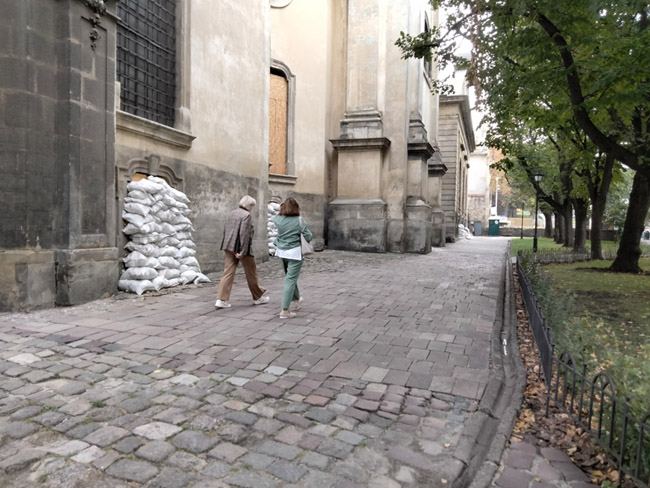
Lviv church with sandbags
While the past is not far from people's minds,
different versions of the present and future all collide and combine.
The plywood boards enclosing most of the city's evocative old statues
remind people of the bombing that happened at the beginning of Russia's
full-scale invasion, and the danger that persists. On the plywood
concealing the statue of Neptune at the ancient market square called
Rynok, there is a painted facsimile of the hidden statue. An inscription
predicts: "We will admire the original again after victory."
We sat and had an early evening tea outside a
coffee house in the touristic shopping area near the Opera House. I
commented how the pedestrian zone in Sarajevo, at this time of day,
would be congested with people walking back and forth in their
leisurely, sociable way. Artem responded that this happens during the
summer, but now, with the war going on, soldiers will come around and
give the young men a summons to report for duty. He also mentioned that
at the beginning of the war, a friend of his was sent to fight in the
Sumy region and was never heard from again. There was no body found to
bury.
Curious about wartime changes in the use of
language, I asked Artem if he had grown up speaking Ukrainian. He told
me he had; Galicia is, after all, a stronghold of the Ukrainian
language. But, he said, classes at the art institute where he studied
were all held in Russian. This changed, with Ukrainian independence, in
1991. "This war started because of language," Artem told me. I
understood this as a metaphorical statement.
I noted the glitziness of the shops lining the
street: many coffee shops, souvenir stores, privately owned groceries
and pharmacies, here and there a second-hand store or a pet food store.
Artem confirmed my speculation that this consumer-oriented scene was
radically different from what had been familiar to him with when he was
a young man during the Soviet period.
At the beginning of the February 2022 invasion,
Artem's wife and children had fled and taken refuge in western Europe.
He was not able to rejoin them, as men under 60 were not allowed to
leave the country.
English class
I met young Yulia, who teaches English classes
at the Ukrainian Catholic University. She invited me to come and talk to
her students for two sessions. With a few dozen bright young students,
we discussed our favorite authors: Galeano, Orwell, Roald Dahl. The
students asked if I considered 1984 to be an important book,
which led to a discussion of fascism and its potential to appear
anywhere. As I introduced some vocabulary, Yulia wrote on the
whiteboard: "colloquial"; "appeasement"; "incumbent"; and "resilience."
I asked, "What about Ukrainian authors? Is there
someone who comes to mind that you think is important?" One
student brought up Taras Shevchenko, born a serf in the early 19th
century. As a young man, he displayed such artistic talent that a
sponsor bought his freedom. Shevchenko went on to become an acclaimed
painter and poet. Due to his promotion of the Ukrainian language,
Russian leaders exiled him and banned his writing for a time.
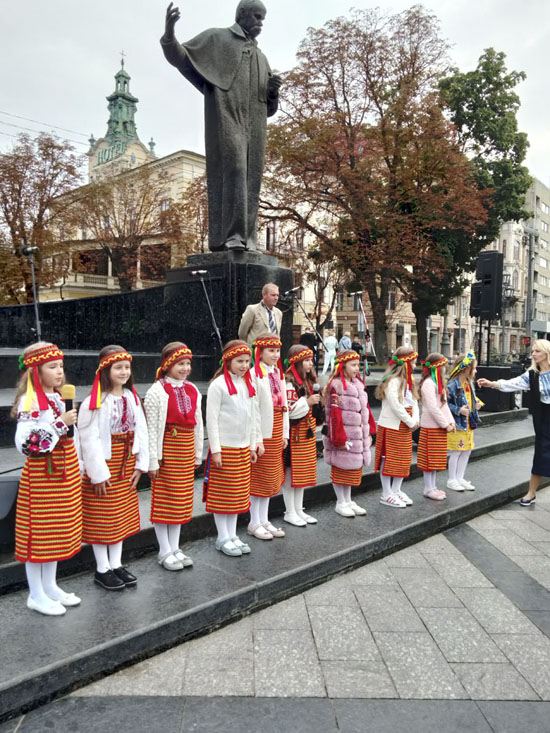
Children's presentation in front of statue of Taras Shevchenko
A statue of the poet stands by the main parkway
not far from the National Opera. Shevchenko is revered today as an early
advocate for Ukrainian cultural identity, and in many cities, the main
street bears his name. I asked the students if they enjoyed reading the
works of this man who lived nearly 200 years ago, and they replied that
they did.
Early during my time in Ukraine I learned that
wherever a conversation starts, it quickly turns to the war with Russia.
This was the case in the English classes. One young woman asked what I
thought about banning the Russian language, and I turned the question
back around to the class. There was strong sentiment against the
language that these Galicians considered a foreign imposition. One young
man even advocated that Ukrainians should shun Russian literature and
film.
Students were not shy to contribute their
opinions about Russia, saying, "They want to destroy Ukrainian culture;
they consider it insignificant. They call us Malorossiya, Little
Russia." One student stated that the Russians want to expand their
borders to the extent of the former Russian Empire.
Another student added, "We hate the Russians
[prompting nervous laughter] for the wrong they've done. They want to
destroy our culture and implement Russification, and eliminate our
national being. They say we are Russian, but we are not."
Winding up my visit, I asked the class what they
expected would happen in Ukraine. One student acknowledged, "A lot
depends on American supplies." Another volunteered, "Trump will win the
election." The students were curious about the upcoming US elections.
One student asked if Hillary Clinton could run for president, and I
explained that someone who has run and lost more than once generally
gives up. Another asked if Obama could run for president again.
The students expressed a calm militancy,
favoring continued "resistance without compromise," as they put it. Some
of them noted that although Lviv was far from the front, support for the
war effort has been strong. I was told that a high number of people from
the Lviv area, as well as some other areas that are less subject to
attack, volunteered to join the army. And people in Lviv have
continuously been contributing in other ways such as sending supplies.
The war is never far from their minds.
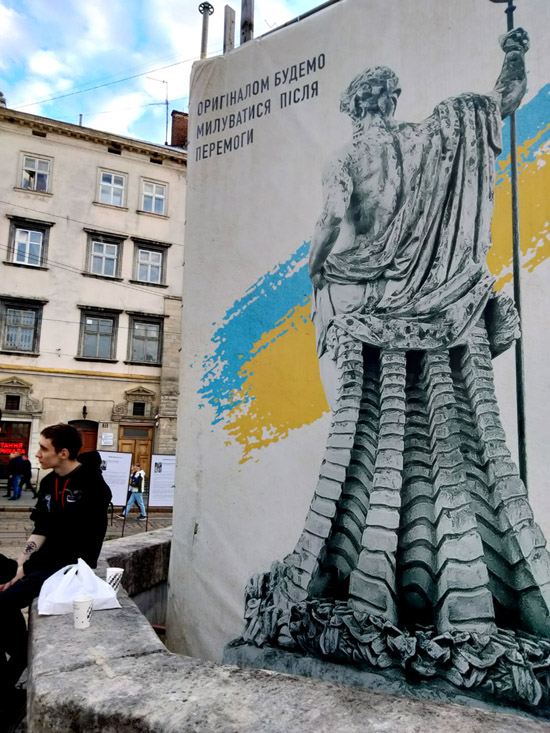
Shielded statue, Lviv
I finished my visit to Lviv with a feeling of
sadness for the separated families, the trauma of violent attacks, and
the thwarted dreams of an interrupted future.
Kharkiv: Trauma,
identity, and militancy
After a visit to Kyiv, Ukraine's capital, I
traveled to the eastern city of Kharkiv, not far from the border with
Russia. For more than the first half year of the full-scale invasion,
Russian forces occupied most of Kharkiv Oblast (region), but not the
city. The city itself was pounded, the residents terrorized. Arriving
there, I saw great damage to many of the large administrative buildings
of the city. The windows of these buildings and the surrounding shops
were boarded up with plywood.
I wrote Vira, an acquaintance from Kharkiv who
took refuge in Germany during the worst of the Russian assault. I asked
her if she needed anything from the city. She responded, "Get out of
Kharkiv immediately!" However, while there were occasional air-raid
sirens, life seemed to carry on in a normal way, with people shopping
and store-owners conducting business.
I had been somewhat nervous to go to Kharkiv.
Just a few days before I arrived, the Russians fired a missile that hit
a grocery store and café in Hroza, a village near the town of Kupiansk,
to the southeast of Kharkiv. The bomb killed more than 50 people. They
had been attending a memorial for a local Ukrainian soldier who was
killed earlier by the Russians. The next day, a bomb struck within the
city of Kharkiv, killing a ten-year-old boy and his grandmother.
While I was in Kharkiv and afterwards, such
attacks continued sporadically, most of them targeting outlying parts of
the oblast. Kharkiv is no longer on the front line, and the bombings
strike me as a form of harassment.
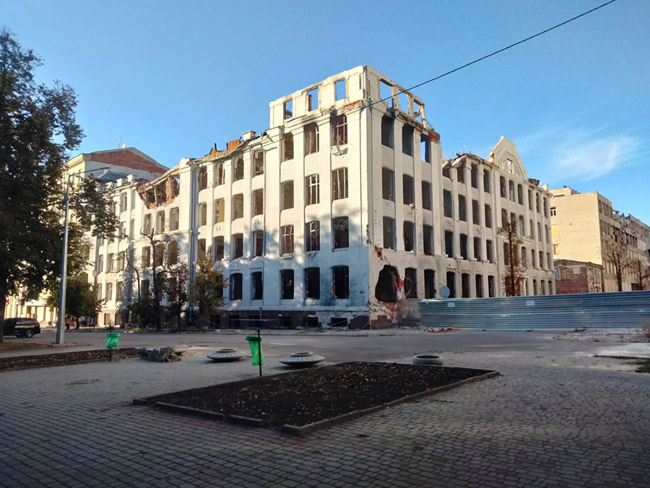
Heavily damaged building in Kharkiv
I had arranged to meet with staff members at
Karazin University, one of the largest and most prestigious universities
in the country. There I met with Alina, a young administrator who
volunteered to show me around. With her family, she had fled the region
for western Ukraine during the height of the Russian assault, but
returned alone after about a year. She now lives in her native city
without any relatives, most of whom remained outside of Ukraine. Alina
told me that she had no interest in living in exile, that she loves her
apartment and her friends, and that Kharkiv is her home. She was
determined to stay there, "regardless of what happens."
Alina told me that people in her family spoke
Ukrainian and Russian. She had grown up speaking Russian and studying
Ukrainian; now she had renounced Russian. "I am done with the Russians,"
she said. She explained that at the beginning of the war in 2014, when
she was a young teenager, some girls from occupied Luhansk came to her
class as refugees. They had lost most of their family and were
permanently displaced. Upon hearing their story, Alina felt very angry
and sorry for the girls.
There are "progressive" activists in the United
States who ignore the entire narrative of Ukraine's gradual move towards
complete independence from Russia. Although that independence came
formally by declaration in August of 1991, it has been a gradual
process. A milestone in that process was the Maidan revolution, also
known as the "Revolution of Dignity," which took place from November
2013 to February of the next year.
The events at Maidan, the main square in Kyiv,
were set off in response to President Viktor Yanukovych's last-minute
rejection of a promised agreement on economic cooperation with the
European Union. Citizens of Ukraine reacted in disappointment and
outrage at Yanukovych's clear capitulation to Russian imperatives.
After several freezing months of protest and the
killing of some hundred protesters by Yanukovych's special forces, the
president was compelled to resign office and flee to Russia. People in
the West who wish to brush off the power and significance of this
grassroots movement often assert that the entire episode was an
"anti-democratic" one, and a "coup fomented by the United States."
Thinking of this accusation, I asked Alina how
she understood the Maidan revolution. She responded, "It was a
revolution so that there would not be corruption, for there to be normal
reforms, a normal system. Many people gave their lives. They were
fighting for freedom, as we are today. That's how it was at Maidan. It
was very good that they got rid of Yanukovych. We Ukrainians are
Europeans, and we want to have the opportunities for travel and growth
that other people in the West have."
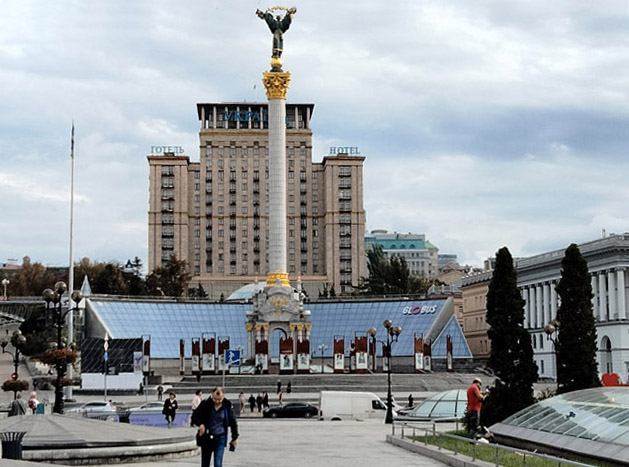
Maidan Square, Kyiv
I asked if people in Kharkiv supported the
Maidan revolution. Alina said, "The majority supported it, but not
everyone. My family supported it. We were, and are, in favor of
democracy. It is a matter of justice, and for there to be a normal
functionality of the state. One needs to respect the fact that people
gave their lives for this at Maidan, young people who were killed. This
was about people wanting to be part of Europe"
I walked with Alina around Freedom (Svobody)
Square, which used to be called Dzerzhinsky Square after the early
Bolshevik head of the secret police. I asked Alina what she thought the
Russians wanted out of this war. She said, "I can't understand what's in
Putin's mind. He is a sick person. I hate him, and I hate the Russians
too. They are cold. They are responsible for this war, as is Putin. But
we are strong. They cannot defeat us."
One night in Kharkiv I heard an air-raid alarm
as I was going to sleep. I did not think much of it. I had reserved a
hotel room without a view, avoiding the top floor, as I had been advised
to do. The next morning I received a text from a friend in Lviv, asking
if I were all right. There had been a bombing in the area; the Russians
had flown 33 Iranian-made drones over Ukraine, mainly toward Kharkiv and
Odessa. The Ukrainians shot down 28 of them. Four or five places on the
outskirts of Kharkiv were hit a short time after I heard the alarm. A
couple of houses were damaged and one man was wounded.
Language shifts
At Karazin I spoke briefly with the
administrator of the Erasmus student exchange program. When I asked her
about use of the Russian language, she told me that all classes were
going to be taught in Ukrainian: "People are too traumatized by
Russian." This policy applied to all school classes, and political and
economic usage as well.
Nadia, a professor of English, told me, "Before
last year's invasion, many people spoke Russian; now definitely fewer
are speaking the language. The change is harder for older people. On the
streets now, mainly you will hear Ukrainian. Generally I will speak
Ukrainian when I'm talking to someone I don't know. If it's someone I
know who mainly speaks Russian, then I will speak Russian with them."
Nadia continued, "Students in this region all
learned Ukrainian from the beginning of their studies. In order to pass
entrance exams to get into the university, you had to take them in
Ukrainian. Then classes could be taught in one language or the other,
depending on what the students and the teacher preferred and agreed.
Usually the teacher would ask which language students preferred."
I asked if someone's main language was Russian,
would they still identify themselves as Ukrainian? Nadia answered that
this is something that has been changing: "It is reasonable that people
are more committed in their Ukrainian identity now."
I mentioned to Nadia discussions taking place
abroad to the effect that the war must be stopped at all costs, that
negotiations for peace are imperative. I asked whether her colleagues
and friends agreed with this. She answered, "Now, no. These thoughts
were current in the spring of 2022, when there were some negotiations.
Some people thought there could be a political resolution. But there
were not even real negotiations when the Ukrainian and Russian
delegations met in Turkey, in March of 2022. We were following the news.
We lost hope for such a resolution of the conflict; it was obvious that
we were still being bombed and shelled, and that these negotiations
would not produce anything positive. Now, people are more oriented to
military victory than to peaceful resolution.
"If someone proposes that we should talk to the
Russians, he or she would receive an absolutely negative reaction. The
majority of people would say, 'How can you say such things, they are
trying to kill us, how can we talk to them?' We should just destroy
them, in a military way."
Nadia noted, however, that there were people who
were willing to say "Let them go," referring to the Russian-occupied
territories. "Some say we could let go of Donbass and Crimea. There was
such talk in the summer last year when we were being shelled. We had
some shelling every night, and people were really tired of it. This was
in August 2022, when they were attacking the Kharkiv region, at the same
time that there were severe battles near Kherson. One person I know
said, 'Let them take Kherson, and maybe then they will leave us alone.'"
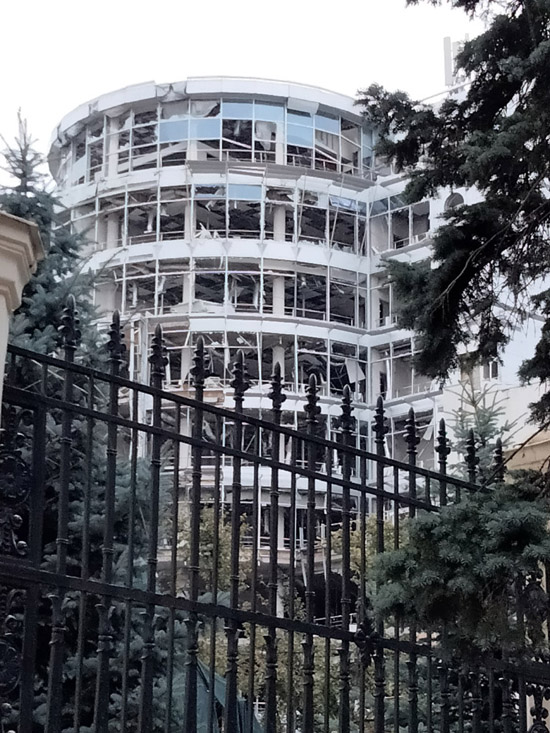
Bombed building, Kharkiv
Trauma
In collaboration with the city government of
Kharkiv, Karazin University is administrating a program for demobilized
war veterans and their families. Nadia explained, "I think that it is
absolutely necessary to address trauma now. We understand that everybody
needs psychological help here, including us. It seems that there is no
person without trauma. We don't always know how people will perceive
unsettling events. For some people, even being compelled to leave home
for two months can be a big trauma that cannot be overcome so easily.
"Particularly for military personnel and their
families, this is a huge question. There are veterans who stopped their
service because they were wounded or there was some tragedy that
affected them. Some have it worse, because they lost relatives during
the military actions. Another problem to be addressed is with families
who lost a loved one, who was killed during military actions. They all
need help, because it is not always obvious how much people suffer from
all this trauma. And in several years, there will also be a huge problem
with children who have been traumatized."
Leaving Nadia's office, I visited a mental
health exhibit in the basement of the university, a space that doubles
as an exhibit room and a bomb shelter. There, I was guided through the
exhibit by Iryna, a psychology student. She discussed ways of teaching
people to take care of their mental health, including breathing
exercises and the "butterfly," where you link your hands at the thumbs
and hold them to your chest.
Iryna told me, "We are trying to help people as
much as we can, to be the kind of community that helps people with the
stresses of war. There are children who have been displaced from the
occupied territories; we help them move into dormitories, and give some
material and moral support to them.
"People are very uneasy now; for example, loud
noises disturb my parents. There are many air-raid alarms, every day,
and at night, too. Sometimes there's an alarm for five minutes, and then
it stops, and then starts again."
I asked, "What do you do when you hear an
alarm?" Iryna laughed and said "Usually nothing, unless it starts to
last longer, but mostly, when we hear sirens, we do nothing. Sometimes,
if you live in an apartment, you go shelter in the basement. But I live
in a private house, so there's no reason to go to the basement. If
something knocks over the house, you'll still be killed."
Kharkiv's population was 2.4 million before the
war, making it the second-largest city in Ukraine. Many people left at
the beginning of the war, as they did in Kyiv and Lviv. But fewer people
returned to Kharkiv; now, Iryna told me, the population is 1.3 million.
I asked if people are trying to live normally. Iryna answered, "Of
course! We want to live our lives. The city is mostly safe, and we can
try to have a normal life, but the risk is everywhere now. But we have a
huge desire to live normally. It is a big change from before September
of 2022, when the Russians were driven out of the region."
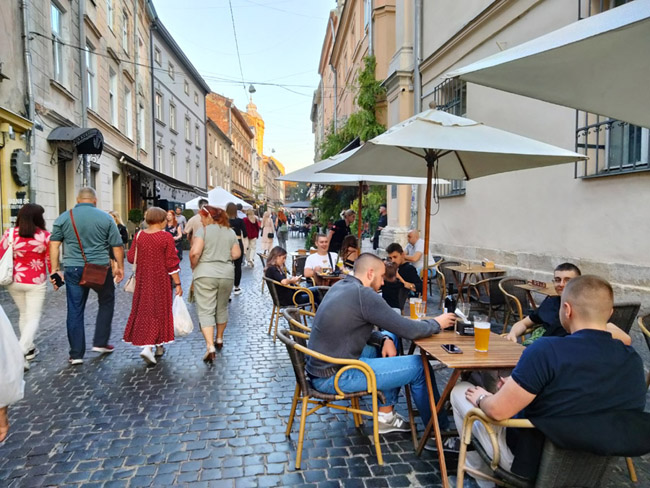
Living normally in Lviv
I mentioned that people were going to the opera
in Kyiv. Iryna said, "That doesn't work here. And all university classes
are still on-line only. Some classes that have labs, such as chemistry,
will start in person soon."
Finally, I asked Iryna what she hoped would
happen with the war. She said, "We don't know [laughs]; we will defend
our country, our borders. We really don't know what is in the future.
Because every time things are quiet for a month, then you see that it is
not finished. At the beginning, we thought, oh, maybe this will only
last for half a year, but then it keeps on going. And we have gotten
used to it."
Toward the end of my stay in Kharkiv I spoke
with Anya and Danilo, an academic and a tech worker, respectively. I
returned to the question of the Maidan revolution. Anya told me that
although there were people in Kharkiv who supported Russia, there was
great public support in 2014 for the Maidan protests, and she witnessed
the toppling of the city's statue of Lenin at Freedom Square: "There
were a lot of people. It was a huge celebration." Danilo added, "The
Revolution of Dignity and the Orange Revolution [2004] were movements
for independence, which are in our nature."
Anya scoffed at the idea
that Maidan had been an "American-led coup," and said that the Maidan
revolution took place from the ground up, and that "the Ukrainian people
are about freedom." In contrast, she said that the Russian people want a
strong leader to tell them what to do and how to think.
Danilo added, "We
Ukrainians do not depend on our government and its authority. We are
quite autonomous. Self-organization is one of our core features, an
element of our mentality. In the Soviet period we were occupied by
Moscow. There was the Ukrainian Soviet Republic, bla bla bla, but we
were absolutely controlled by Moscow. Our claim for freedom made us
willing to fight for independence, and Moscow was not able to discourage
our struggle for freedom, independence, and self-organization.
"Russians are about Gulag. This is a
mindset that is still there. Throughout history, they have been looking
for a Czar, a master who will solve all of their problems, organize
their way of life. They don't want to decide things for themselves."
I argued that it was not so good to make such
strong generalizations, saying "there were some wonderful Russians. They
are in Turkey, in Georgia; they are in Serbia. They left Russia—a
million or more, right?"
Anya answered, "We do not know another Russia.
In history there have been several attempts to make Russia more
democratic. For example, in the very beginning of the 1990s, President
Boris Yeltsin tried. But this attempt was put to an end with the war in
Chechnya. And eventually it led to the presidency of Putin."
She continued, "They
want our land, the whole country. If we don't defeat them, they will
start on other countries. We are up against a huge amount of economic
and military power. Their long-term goal is still to occupy all of
Ukraine. They will at least try to continue to occupy the territory that
they already have. But I don't know if they still have enough resources
to do this. It is about territorial expansion. They are going after the
old Soviet territory. It is also, of course, partly about the
agricultural wealth of our country."
Danilo concluded, "Our resistance is about what
is fair. It is about our rights, our land; why must we give that up?"
I mentioned that I had mainly heard Russian
being spoken in the Central Market. Anya answered, "Yes, but it is
important in the public space for Ukrainian to be the official language,
the state language. In Kharkiv there are some difficulties with this."
Danilo added, "I used to speak Russian, for a long time. But now we have
made a choice to use Ukrainian. It is our mother tongue, our native
language. Why should we choose to speak Russian? It is a bad habit for
citizens of the eastern part of Ukraine, a terrible consequence of
Russian cultural occupation. We've had to face this during a long period
of our history. It is a problem, because it is about our identity. It's
important to realize your identity, that you are Ukrainian, or Russian,
or something else."
Hidden cracks in the unity
When you go into an unfamiliar country such as
Ukraine, seeking to learn the reality of social issues, at first all you
learn is the mainstream opinion. You see the blue and yellow flags, the
exhortation from Kharkiv's mayor Ihor Terekhov: "Kharkiv thanks the men
and women defending Ukraine." You hear the determination of those far
from the front, who speak of those in battle as their first heroes. The
unity is impressive and, I suppose, normal at a time when the country is
under assault.
Then, if you keep listening, you start to hear a
second answer, and a third, about the way society is functioning under
pressure. This is a particularly sensitive question in a society with a
deep history of corruption and an episodic struggle for democracy. What
I have conveyed so far shares some of the raw opinions of the ordinary,
intelligent people with whom I had contact. At times their statements
lapse into essentialism and national mythology, and they display
feelings with which they themselves are not always comfortable. Decent
people do not enjoy feelings of hate, but it seems understandable that
when one's entire country is under a massive, brutal assault, such
feelings could be unavoidable.
It is the same with patriotism, verging upon
nationalism. Russia's escalation has probably been the most effective
force in history for compressing the Ukrainian polity into a homogenous,
self-identifying nation. As an American dissident I am not comfortable
with patriotism, and as a long-time observer of events in former
Yugoslavia, neither am I comfortable with nationalism. But both of these
responses are inevitable in a society under assault. Such pressure
brings out a lowest-common-denominator manner of expression, a
near-universal, simplistic response to any and every dilemma that
confronts people trying to live their lives.
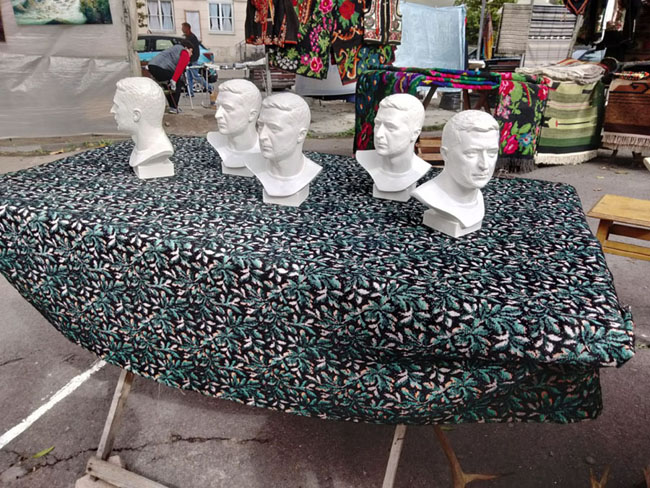
Heroes - busts of Zelensky for sale in Lviv
I continued with Anya and Danilo: "In the outer
world, we think that Zelenskiy came into office to fight corruption.
That is what we have heard. I'm also aware that when you have a war, you
have more opportunity for corruption. So, what is the people's
impression of corruption at this time?"
Anya responded, "It's a painful question for
Ukrainians. Yanukovych stole millions. And then after he was gone there
have been problems with transparency in government. Our people want
transparency. They are tired of the corruption, they do not want to see
it anymore."
I asked, "Do you have
criticisms of Zelensky?" Anya: "There is a low level of political
culture. Zelensky is a new face in politics,
and we don't believe that a man who is not from the political
system can change things. His head of office, Andriy Yermak, has brought
the system of corruption to a new level that people before him did not
dream about. I was for Poroshenko [president of Ukraine between
Yanukovych and Zelensky], so I am not a fan of Zelensky."
I asked, Is there a
political opposition to Zelensky that is, in your opinion, more honest
and democratic?
Anya: "Yes, Poroshenko. However, he is a
so-called oligarch; he is rich. He was in Yanukovych's cabinet. But he
came to the presidency after that, and has gone back and forth. Now he
is a nationalist. He is a rival of Zelensky, and they had opposing
programs during the last presidential campaign, but in fact they work
together."
I mentioned that I had watched Zelensky's TV
series "Servant of the People," created when Zelensky was still a
comedian. The show depicted him "inadvertently" running for president
and being elected. "It was a masterful piece of campaigning," I said.
"In America, we see the big picture, grand moves in a symbolic way. We
don't understand local conditions. We see Russia, big Russia, big
Ukraine, Zelensky the leader, who is famous for saying, 'I need
ammunition, not a ride.' That is charismatic."
"What about Poroshenko's charisma?", Anya asked.
"Oh, we don't know anything about Poroshenko.
We're Americans. We don't know anything," I responded.
I wrapped up our conversation by asking,
"Leaving aside criticism and jockeying at the political level, do you
feel that democracy is alive in Ukraine?"
Danilo answered, "Yes, I believe that. Our
people defend democracy. We are defending grassroots principles. The
grassroots embodied in Maidan is where the real progressive opposition
resides."
Anya added, "Democracy is the main idea that we
are fighting for, against Russia, or anyone else. We should recall that
the Revolution of Dignity was about this. There was a phrase circulating
at that time: 'Freedom is our religion.' That is our national idea."
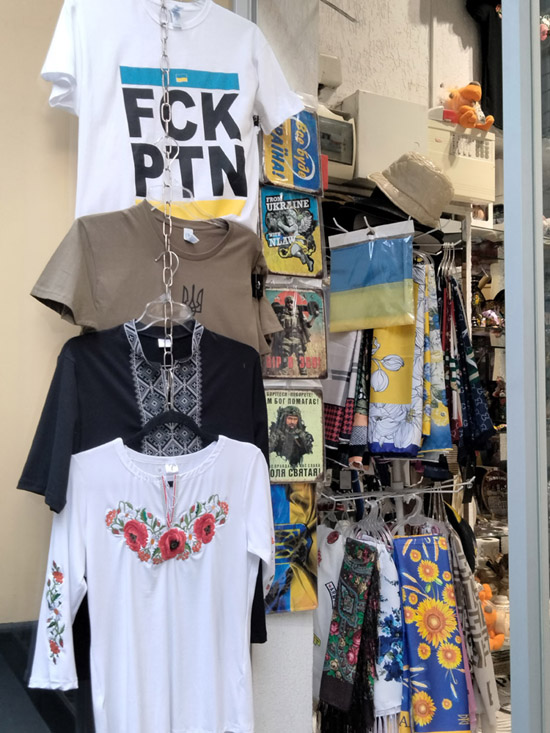
Souvenirs in a shop in Lviv
Looking forward
I am not someone who takes satisfaction in
predicting the future. Ukraine is already an unlucky country, albeit a
brave and determined one. As I write, the US Congress stretches out a
politicized debate on much-needed arms assistance to Ukraine. It is not
hard to be fatalistic. Military events in the spring and summer of 2024
will show the world whether the present stalemate is a long-term one,
which works to the benefit of Russia, or Ukraine will make significant
gains to de-occupy more of its territory.
For now, as I have mentioned, Ukrainians are
massively united in support of their president and their troops in the
south and east. Patriotic fervor is at a high level. This may be
sustainable if Ukraine manages to break the stalemate—necessarily, with
significant assistance from the West. A Republican victory in the US
elections in 2024 will probably extinguish any hope of significant
American assistance. And if the war drags on, hidden strains, as hinted
at by Anya and Danilo, will come to the fore. An unfair resolution, with
Russia taking over significant parts of Ukraine and leaving much of the
country's economy in ruins, is another possibility. Such an outcome will
guarantee permanent instability, both within Ukraine and
internationally.
Next article:
Nationalist history; grim monuments; and new heroes